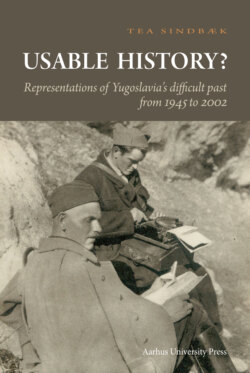Usable History?

Реклама. ООО «ЛитРес», ИНН: 7719571260.
Оглавление
Tia Sindbaek. Usable History?
Preface
1 Introduction:
Thematization and cardinal theme
Historical culture and use of history
The importance of context
Genocide, term and theme
The term and theme of genocide in Yugoslavia
Sources
NOTES
2 The Second World. War in Yugoslavia
Disintegration and war regimes
Ustasha
Chetniks
Partisans
Partisan victory
Massacres and war crimes
Ustasha crimes
Chetnik crimes
Partisan crimes
Numbers of victims
NOTES
3 Establishing an official. narrative, 1945-1948
The communist reconstruction of Yugoslavia
The first official accounts
The official report on Jasenovac
Settling accounts
The trial against Mihailović
The trial against Stepinac
Tito’s 1948 report of the war
NOTES
4 Massacres in memoirs. and fiction, 1945-1952
The bloody cloth of Krajina – massacres in memoir literature
Jasenovac
The war and its massacres in songs and poetry
Partisan novels
NOTES
5 Titoist institutional. historiography, 1945-1960
Breaking with Stalinism
Historiography and society
Education
Titoist historiography of the massacres
The NDH and the Catholic Church
Pavelić and the NDH
Towards a historical synthesis
NOTES
6 New perspectives on wartime. history, 1960-1980
Yugoslav politics
Professionalized historiography
Republican and national research environments
New perspectives on Second World War history
Genocide becomes an issue
Dedijer’s Istorija Jugoslavije
Colić’ Takozvana Nezavisna Država Hrvatska
Towards a theme of genocide?
NOTES
7 Public commemorations and. popular culture, 1960-1980
The memorial area of Jasenovac
Partisan poetry
Partisan songs
Epic poems
War films
Partisan films
The war as an inter-Yugoslav conflict
History schoolbooks
NOTES
8 The breakdown of communist. history and the theme of. genocide, 1980-1986
Politics of crisis
Fractured historical culture
The breakdown of communist history
The rehabilitation of the Chetniks
Thematization of wartime massacres in literature
Drama
Wartime history and the concept of genocide in public debate
The national churches and wartime history
Genocide as a metaphor – Kosovo and Croatia
NOTES
9 Genocide as a cardinal. theme, 1984-1989
Politics and national tensions
The development of genocide historiography
Jasenovac
The role of the Catholic Church
The trial of Andrija Artuković
Croatian reactions and genocide discussions in the press
A genocidal trait of Croat culture?
Jasenovac and the “Jasenovac myth”
The Catholic Church
The Artuković trial
Numbers of victims
NOTES
10 National conflicts and national. historical cultures, 1990-2002
The establishment of the Croatian national state
The Bleiburg tragedy and the thematization of genocide in Croatia
Towards a Croatian national history
The lack of transition in Serbia
The theme of genocide in Serbia
Teaching Serbian war history
The Bosnian war
Bosnian historical culture and the theme of genocide
Towards a Bosniak national history
NOTES
Conclusion
Literature
Отрывок из книги
Tea Sindbæk
Usable History?
.....
12 For discussions of the concept of ‘collective memory’ see Amos Funkenstein, ‘Collective Memory and Historical Consciousness’, History and Memory, 1, 1989, 1, 5-26; Noa Gedi and Yigal Elam, ‘Collective Memory – What Is It?’, History and Memory, 8, 1996, 1, 30-50; Anette Warring, ‘Kollektiv erindring – et brugbart begreb?’, in Bernard Eric Jensen et al., eds., Eridringens og glemslens politik, Roskilde, Roskilde Universitetsforlag, 1996, 206-231. The concept ‘collected memories’ was suggested by James E. Young in order to take into consideration the individuality of remembrance, Young, The Texture of Memory, xi.
14 For a discussion of the recent changes in the relationship between memory and history, see Pierre Nora, ‘Reasons for the Current Upsurge in Memory’, Eurozine, 19 April 2002.
.....